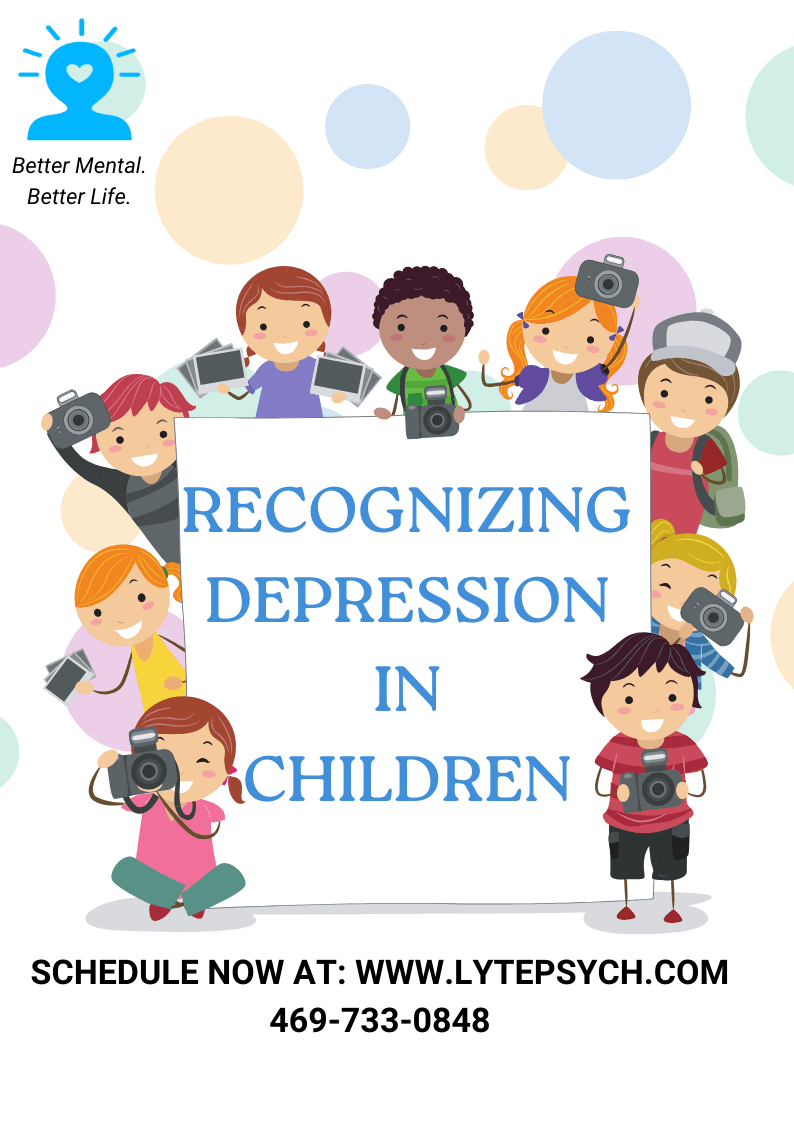Thu Feb 08 2024
Best Adolescent Psychiatrist Near Me: Expert Help for Childhood and Teenagers with Depression at Lyte Psychiatry in Dallas, TX

Understanding Childhood and Teenagers with Depression at Lyte Psychiatry. Dallas, TX. Best Adolescent Psychiatrist.
Childhood depression is a serious mental health issue that affects a significant number of young individuals. According to recent statistics, an alarming 10-15% of children and teenagers experience symptoms of depression before reaching adulthood. As a parent or caregiver, it is essential to be aware of the signs and symptoms of depression in teenagers and children, as well as understand how to provide support.
Recognizing the Signs of Childhood Depression:
Recognizing the signs of childhood depression is crucial for early identification and intervention. Some common signs to look out for include persistent sadness, irritability, loss of interest in activities, changes in appetite or sleep patterns, difficulty concentrating, feelings of worthlessness, and recurrent thoughts of death or suicide
What are the symptoms of depression in a child?
Depression in children might look different than it does in adults. And it might look different for each child. Signs and symptoms of depression in a child include:
Mood changes. Your child might seem sadder or more irritable than usual, and they feel this way most of the time.
Lack of interest in fun activities.
Low energy levels or general tiredness.
Negative self-talk or low self-esteem. You might hear your child say negative things about themselves. They may feel worthless.
How to Identifying Depression in Teenagers: The Lyte Psychiatry Way.
Adolescence can be a challenging period, and it is not uncommon for teenagers to experience mood swings. However, it is important to distinguish between normal teenage behavior and signs of depression. Look for symptoms such as persistent feelings of sadness or hopelessness, withdrawal from friends and activities, changes in academic performance, increased irritability, substance abuse, and self-destructive behavior.
Diagnosis and Tests
How is depression diagnosed in children?
If you think your child is showing signs of depression, talk to a healthcare provider. Start with your child’s pediatrician. They may refer you to a mental health professional for a more detailed evaluation. Their healthcare provider will likely start by ruling out conditions that may be causing your child’s mood issues. Illnesses known to cause symptoms of depression include:
Diabetes.
Hypothyroidism or hyperthyroidism.
Types of depression in children
Major depressive disorder: Some people call this clinical depression. It’s the most well-known type of depression in children. If your child has a major depressive disorder, they may feel sad hopeless, or angry easily. They may have trouble sleeping, or they may sleep too much.
Premenstrual dysphoric disorder (PMDD): This condition can happen after your child gets their first period. If your child has PMDD, they may have symptoms of depression and/or anxiety that start about a week before they get their period each month.
Seasonal affective disorder (SAD): The symptoms of SAD are like those of major depressive disorder, but they come and go with the seasons. It’s common for people to have symptoms during the dark, cold winter months. But it can happen in any season.
Disruptive mood dysregulation disorder: They may be physically or verbally aggressive. When a tantrum is happening or your child lashes out at you, it might not feel you like your child is sad. But it’s always a good idea to let your child’s pediatrician know if you think their behavior doesn’t match their age.
How common is depression in children and teens?
About 3% of children and teens between the ages of 3 and 17 have depression. It’s more common in teens than children. About 1 in 5 teens have been diagnosed with major depression. And that’s only those that have an official diagnosis. The actual number is likely much higher. In children and teens with certain chronic illnesses like diabetes, epilepsy, chronic pain, and asthma, the rates of depression might be even higher.
Medications
The most common antidepressant medications for children are selective serotonin reuptake inhibitors (SSRIs). These medications increase the level of serotonin in your child’s brain. Serotonin is a chemical that can help increase their feelings of happiness and well-being. Common SSRIs that providers prescribe to treat childhood depression include:
Fluoxetine (Prozac®).
Paroxetine ((Paxil®, Pexeva®).
Sertraline ((Zoloft®).
Seeking Help: Treatment Options for Childhood Depression at Lyte Psychiatry, Dallas, TX.
It is crucial to seek professional help if you suspect your child or teenager is experiencing depression. Lyte Psychiatry, located in Dallas, TX, is a trusted mental health resource specializing in working with children and adolescents. We offer various treatment options, including therapy, medication, and alternative approaches. To learn more about seeking professional help and the available treatment options, visit our website.
FAQ Section
Q: How can I seek professional help for my child's depression?
A: Lyte Psychiatry is a trusted mental health resource that specializes in working with children and adolescents. You can visit our website to learn more about our services and schedule an appointment.
Q: What should I do if my teenager refuses to seek help for their depression?
A: It can be challenging when a teenager refuses to seek help for their depression. However, as a parent, you can still provide support by encouraging open communication, educating yourself about depression, and seeking guidance from professionals.
Q: Can childhood depression be cured?
A: While there is no definitive "cure" for childhood depression, it can be effectively managed and treated with the right interventions. Early identification, therapy, medication, and support from mental health professionals and loved ones can significantly improve a child's well-being.
Schedule an Appointment with us. Click Here
To see the service we provide. Click Here
If you have any questions, feel free to call us at 469-733-0848